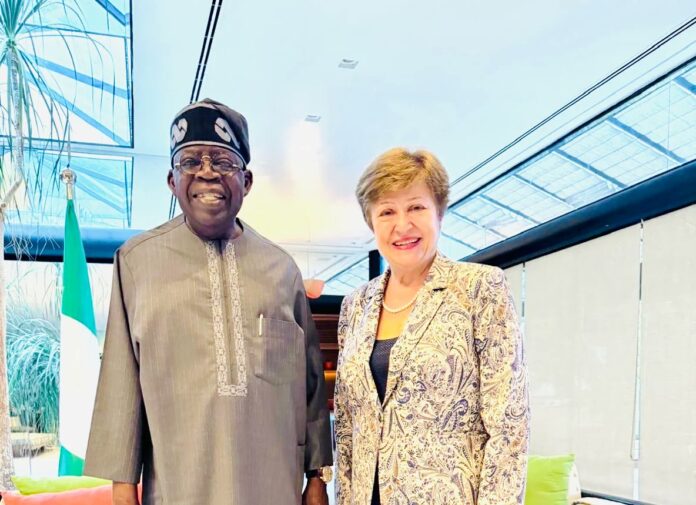Kristalina Georgieva-Kinova, the Managing Director of the International Monetary Fund (IMF), has expressed strong support for Nigeria’s President Bola Tinubu’s economic reforms, praising them for accelerating growth and creating jobs for the country’s young and dynamic population.
Georgieva-Kinova shared her comments after a meeting with President Tinubu at the G20 Summit in Rio de Janeiro, Brazil, on Thursday.
In a post on her official social media handle, the IMF chief emphasized the importance of the actions taken by Tinubu to reform Nigeria’s economy.
She praised Nigeria for its “decisive actions” aimed at revitalizing its economic landscape, acknowledging that the reforms would not only drive growth but also offer much-needed job opportunities for Nigerians.
“The IMF strongly supports Nigeria on this journey,” Georgieva-Kinova wrote, reinforcing the global financial institution’s backing of Tinubu’s policies.
Despite her praise for the government’s reform efforts, Georgieva-Kinova’s comments come amidst mixed signals about the success of those reforms.
The IMF’s latest report on sub-Saharan Africa, released just days before the summit, suggested that Nigeria’s economic growth under Tinubu’s leadership has been slower than expected.
The IMF report indicated that while the reforms in other African nations like Ghana and Zambia have shown promising results, Nigeria has lagged behind.
In the IMF’s growth projection for 2024, Nigeria’s economy is expected to grow at a rate of just 3.19%, falling below the average regional growth rate of 3.6%.
IMF Deputy Director Catherine Patillo, who presented the report at the Lagos Business School, confirmed that most African nations had managed to reduce macroeconomic imbalances through fiscal consolidation.
However, she pointed out that Nigeria was not among the countries that had shown significant progress.
The report further highlighted that inflation remained a persistent issue in Nigeria, with the country experiencing double-digit inflation, much like Angola and Ethiopia.
“Inflation is still in double digits in almost one-third of countries, including Angola, Ethiopia, and Nigeria,” Patillo noted, adding that the inflation rate was above target in many countries across the region.
This is in line with the troubling inflation data recently released by Nigeria’s National Bureau of Statistics (NBS).
In its October report, the NBS revealed that Nigeria’s headline inflation rate had risen to 33.88%, an increase from 32.70% in September.
The report indicated that food inflation was particularly severe in states such as Adamawa, Sokoto, and Yobe, where the cost of essential goods has been escalating at an alarming rate.
The rising inflation has put tremendous pressure on Nigerians, especially the lower-income population, who are struggling with the increasing cost of living.
Georgieva-Kinova, however, remained optimistic, commending the government’s ongoing efforts, despite the economic challenges.
She acknowledged that the road to reform was not easy and that it would take time for the full benefits to be realized.
“The actions taken are necessary to set Nigeria on the path to sustained growth,” she said.
Her support for Tinubu’s reform agenda signals that the IMF is committed to providing assistance as Nigeria navigates its economic challenges.
While inflation and rising living costs continue to pose serious challenges, the IMF’s backing provides some reassurance that Nigeria is not alone in its efforts to achieve long-term economic stability.

